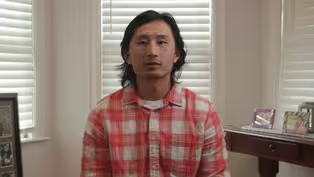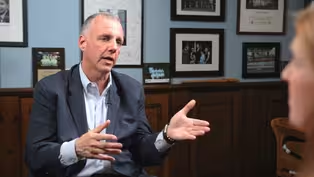
A Slave’s Story
Clip: Season 6 Episode 8 | 8m 10sVideo has Closed Captions
A local professor discovers a fugitive slave’s article written years before the Civil War.
A local college professor stumbles upon a rare find: an autobiography written and published by an escaped slave years before the Civil War. Even more remarkable the fugitive names plantation owners, government officials, and even the U-S Constitution for the human bondage dividing America. What’s more, the slave’s story has ties to the Quaker community in Rhode Island and Southeastern Massachus
Problems playing video? | Closed Captioning Feedback
Problems playing video? | Closed Captioning Feedback
Rhode Island PBS Weekly is a local public television program presented by Ocean State Media

A Slave’s Story
Clip: Season 6 Episode 8 | 8m 10sVideo has Closed Captions
A local college professor stumbles upon a rare find: an autobiography written and published by an escaped slave years before the Civil War. Even more remarkable the fugitive names plantation owners, government officials, and even the U-S Constitution for the human bondage dividing America. What’s more, the slave’s story has ties to the Quaker community in Rhode Island and Southeastern Massachus
Problems playing video? | Closed Captioning Feedback
How to Watch Rhode Island PBS Weekly
Rhode Island PBS Weekly is available to stream on pbs.org and the free PBS App, available on iPhone, Apple TV, Android TV, Android smartphones, Amazon Fire TV, Amazon Fire Tablet, Roku, Samsung Smart TV, and Vizio.
Providing Support for PBS.org
Learn Moreabout PBS online sponsorship- I think my head exploded and I think that my immediate response to my head exploding was, this can't be real.
- [Pamela] But it was.
Author Jonathan Schroeder discovered a real life, rare story far from the fiction he lectures on at Rhode Island School of Design.
Schroeder teaches sci-fi and fantasy literature, but while doing some research, he stumbled upon an African American's autobiography printed in a newspaper in 1855.
- So I had to click on the document and kind of hold my breath and scroll through.
- So when you found this, what went through your mind?
Did you know you'd made a big discovery?
- I knew immediately that this was a once in a lifetime discovery.
What I had like no clue about was how do you bring something like this back into the world in a way that does justice to its author?
- [Pamela] That author was John Swanson Jacobs.
This is the only known portrait of Jacobs.
- John Jacobs was born around 1815 in Edenton, North Carolina.
He and his sister, Harriet Jacobs were six generation slaves and both of them would become over the course of their lives, the first members of their family to be able to tell their story of over 150 years in slavery.
- [Pamela] Harriet Jacobs is noted for her book called "Incidents in the Life of a Slave Girl."
She and her brother escaped bondage and came via providence to New Bedford, a Quaker capital of anti-slavery resistance.
There they met famed abolitionist Frederick Douglass.
What they gleaned in collaboration with him.
- The possibility for decrying slavery by calling out slave owners and politicians and American law by their names.
And that's very different than the more conventional autobiographical slave narrative.
- [Pamela] Jacobs found work on the New Bedford Docks and he escaped a second time on a whaling ship.
Schroeder says many African Americans did this to elude slave catchers.
- We signed up for a ship called the Francis Henrietta and sailed around Cape Horn and into the Pacific.
- It was aboard that ship, voyaging all over the world, that Jacobs had time to practice reading and writing skills learned in New Bedford.
He eventually became a gold prospector in Australia.
You did not set out to find him.
How did you unravel his story?
- I was just looking for information on Harry Jacobs's son who had gone to Australia in 1852 with his uncle John, who was not the major character that I was following.
- [Pamela] Turns out Harriet's son Joseph had died of fever.
Schroeder was digging into that story online when he happened upon the two part article.
- [Schroeder] This is it.
- [Pamela] Written by John Jacobs and published in "The Empire," an anti-slavery Australian newspaper.
- John Jacobs just walked in one day and initially said, "Can I borrow the a copy of the Constitution and a copy of this history of the United States?"
And in the course of talking to them, he used his rhetorical and elocutionary skills and he persuaded them not simply to loan a couple books to him, but to publish his life story.
It was published over the course of two days in "The Empire."
Single page of "The Empire" would be about twice the size of a single page of the New York Times today.
The editors say in their short introduction that they scarcely altered a word.
- That rediscovered narrative written by a fugitive was titled "The United States Governed by 600,000 Despots, A true Story of Slavery."
It is republished in Schroeder's new book along with Jacob's full biography.
What makes John Jacobs story so extraordinary?
- I think the fact that he is writing from outside the United States without fear of reprisal and with the ability to, you know, write, we would say, speak his mind write in an unfiltered, unapologetic manner.
- [Pamela] Schroeder says the document illustrates the former slave's ability to critique the laws of the United States as well as its citizens.
- The 600,000 despots refers to the slave owners and their families who owned the three or three million plus enslaved people in the United States in 1850.
He names almost all of the prominent politicians who were responsible with four compromises, with the southern slave holding states leading through 1850.
And he calls out the wealthy planters of the region of North Carolina where he was from.
- [Pamela] Schroeder says, the most remarkable part is.
- You are asked to stare directly at those who are responsible for enslaving others and for making slavery possible if you are a white American, whether you're southern, if you're a southerner or a northerner, you are also going to have to ask yourself, are you implicitly responsible for maintaining slavery in the United States?
- [Pamela] Schroeder reads a quote from Jacob's article published so long ago.
- "They can no longer say, 'This sin does not lie at my door.'
They can no longer say, 'I am not my brother's keeper.'
The blood of your colored countrymen cries out against you."
- And this story lay buried in the newspaper with very little effect for over a century.
- I don't think it was ever remembered from a few days after it was published.
I haven't found any mention of it after April 26th, 1855, and so it went to live wherever stacks of this old newspaper went.
- [Pamela] Jacobs died at age 58.
His grave marker bears the simple inscription, "Brother."
He is buried near his sister Harriet and other family members at Mount Auburn Cemetery in Cambridge, Massachusetts.
Schroeder is currently researching another branch of Jacob's story.
The author has uncovered how Quakers from Rhode Island, including abolitionist, Moses Brown, helped Jacob's grandparents escaped to Smithfield, where they work spinning yarn in a textile mill.
For some unknown reason, the family returned to the South.
Schroeder says he's determined John Jacob's story will never again be lost to history.
- I see this project as being kind of part and parcel of a longer term project of bringing the Jacobs family back into the public eye.
Video has Closed Captions
Clip: S6 Ep8 | 5m 42s | Growing up Hmong: A family’s story of survival. (5m 42s)
Video has Closed Captions
Clip: S6 Ep8 | 9m | Pawtucket Mayor Donald Grebien describes how an old mill city is reinventing itself. (9m)
Providing Support for PBS.org
Learn Moreabout PBS online sponsorship
- News and Public Affairs

Top journalists deliver compelling original analysis of the hour's headlines.

- News and Public Affairs

FRONTLINE is investigative journalism that questions, explains and changes our world.












Support for PBS provided by:
Rhode Island PBS Weekly is a local public television program presented by Ocean State Media

